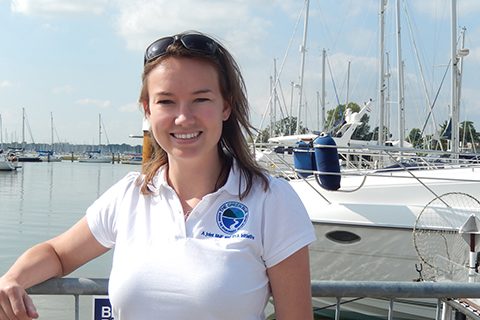The RYA tell us about the ‘Check Clean Dry’ initiative to help stop the spread of invasive species and diseases.
Words & Photos RYA
The 13th – 17th May 2019 was ‘Invasive Species Week’ and is your chance to get involved and protect our waters from the spread of invasive aquatic species. Unwanted non-native plants and animals are invading our waterways and pose a serious threat to our lakes, rivers, streams and coastline. Once in a waterway these invasive species can disperse rapidly, adversely affecting recreational facilities, reducing fish populations and restricting navigation.
Windsurfing provides the perfect vehicle for exploring wilderness areas by water, quietly observing wildlife in their natural habitats and allowing you to calmly explore beautiful waterbodies on the many lakes, lochs, rivers, estuaries and coastal waters across the country. But without knowing, our desire to explore could be contributing to the spread of alien species!
Invasive non-native species can block up waterways, make navigation difficult, and cause irreparable damage to the environment – and as a water user you may unknowingly be spreading them from one water body to another. Animals, eggs, larvae and tiny plant fragments can easily be carried on boards, equipment, shoes and clothing, and some can survive out of water in damp conditions for over two weeks.
Everyone can help to prevent their spread by following the ‘Check Clean Dry’ routine. You can also put up a sign at your local sailing club to remind fellow boaters and share photos on social media under #InvasivesWeek.
• Check your equipment, clothing and footwear.
• Clean everything carefully before you return.
• Dry everything thoroughly.
Since the launch of the ‘Check Clean Dry’ campaign in 2011, “The Green Blue” and the RYA has provided a wealth of information and guidance to inland and coastal clubs about the steps they can take to minimise the spread of invasive non-native species (INNS).
How can I get involved?
If you’re inspired by the great work going on to prevent invasive non-native species from spreading and reduce the impacts of those which already have, why not get involved?
• Help us stop the spread of invasive plants and animals in British waters – put up a ‘Check, Clean Dry’ sign to nudge fellow water users into action.
• Watch The Green Blue’s windsurf guidance at www.youtube.com/watch?v=oijFB7pWIkQ.
• Share a photo on social media under #InvasivesWeek
• Remind your fellow windsurfers that they may unknowingly be helping to spread invasive species from one water body to another in equipment, shoes and clothing.
• Access the free online training at www.nonnativespecies.org/elearning/ to learn more about invasive non-native species, how to identify them, and how you can prevent them from spreading.
• Become a ‘Check Clean Dry’ champion and contact “The Green Blue” for free materials you can share to raise awareness.
Facts and figures
• Around 2,000 non-native plants and animals from all over the world have been introduced to the UK by people.
• There has been a dramatic increase in the number of species arriving in recent years and there is no indication of this trend slowing.
• Most non-native species are harmless but around 10-15% have become invasive and have a negative impact on our environment, economy, and even our health and way of life.
• INNS have contributed to 40% of the animal extinctions that have occurred in the last 400 years.”
• They cost the UK economy at least £1.8 billion a year.
• 9.2% of rivers and canals in England and Wales are infested with Japanese knotweed.
• £100,000 spent by one water works on modifications to cope with Zebra Mussels.
• 84% of the world’s 232 marine eco-regions reported the presence of invasive non-native species.
• Almost two thirds of our non-native plant species in England are of European origin.
Invasive non-native invertebrates such as the killer shrimp, zebra mussels and signal crayfish can have a harmful effect on our freshwater environment. These organisms can reproduce rapidly, compete with or eat our native species and spread diseases and parasites.
“The Green Blue”, the RYA and British Marine’s joint environmental campaign, has developed a series of guidance videos for boaters on how to ‘Check, Clean Dry’ their crafts – including specific windsurf, dinghy, powerboat, and personal watercraft best practice.

Campaign Manager for “The Green Blue”, Kate Fortnam
Campaign Manager for “The Green Blue”, Kate Fortnam, explains: “It’s in everyone’s interest to protect the natural environment that supports our recreational boating activity, that’s why it’s so important to check, clean and dry all your equipment after use so as to minimise the spread of alien species or diseases.”
For more information, visit www.thegreenblue.org.uk. Follow the campaign on Facebook and Twitter @CheckCleanDryGB and @TheGreenBlue.
To find your nearest ‘Try sailing in May’ venue, visit www.rya.org.uk/ptbo
